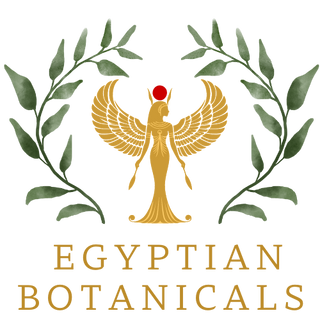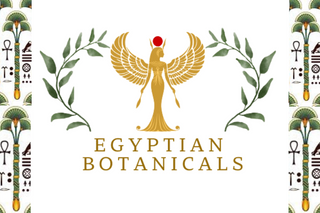Our Story
Egyptian Botanicals uses medicinal botanicals for therapeutic benefit.
As a former social worker Rita Mobarak learned that self-care is the strongest driver of mental and physical well-being and that building resilience toward life's inevitable stressors requires mindful self-care.
When the sympathetic nervous system is overstimulated and constantly activated, the body remains locked in a chronic “fight-or-flight” state. Chronic stress floods the body with hormones like adrenaline, cortisol, and norepinephrine, disrupting one’s emotional and physical health, gradually impairing immune defenses and disrupting nervous system balance. This imbalance contributes to a wide range of health concerns including anxiety, depression, insomnia, irritability, hypertension, digestive issues, and memory problems.
Rita's late Egyptian father proudly shared with her countless Egyptian natural healing remedies. Her father would suggest that she put olive oil in her hair overnight when her hair was dry, sweet almond oil on her eczema, to chew cloves when she had a toothache and use frankincense and myrrh oils on her skin for wound and scar tissue healing.
Rita's father would boil ginger-zanjabil-and honey for Rita when she was sick explaining how important these natural ingredients were for strengthening the body's immune system.
He brushed his teeth with baking soda telling her how the ancient Egyptians chewed natron, a baking soda salt mixture harvested from the dry lake beds in the Nile Delta region, as a tooth cleanser and mouthwash.
He used the ancient healing practice of cupping to activate the immune system and the body’s natural self-healing powers.
He regularly used a loofah for dry brushing his skin, recounting how loofahs are natural sponges harvested from the fruits of the loofah plants around the Nile Delta farms in Egypt.
When they visited Egypt Rita’s father would give her wood licorice root sticks to chew on explaining how they were better than toothpaste for gingivitis.
In Egypt he introduced her to the hibiscus flower and tea made from its leaves-karkade-explaining hibiscus' many health and beauty benefits.
Rita’s father enthusiastically inhaled aromatics from plant extracts and resins such as rose, frankincense, myrrh and lotus explaining how inhaling scents can bypass the cognitive centers of the brain and directly activate the emotional centers, decreasing stress, producing calm, joy, and a sense of well-being.
As a teenager who was obsessed with reading books related to naturopathic wisdom, particularly How to Get Well: Dr. Paavo Airola's Handbook of Natural Healing Rita listened with curiosity but also skepticism. “There’s no research evidence for that,” she would argue. Her father’s answer, always patient and wise, was rhetorical: “Rita, think about it—why would pharmaceutical companies research natural remedies? They can’t patent nature.”
Rita will never forget the moment her father, years after leaving Egypt, inhaled the sweet fragrance of jasmine. In an instant, the memory of home lit up his face—the flower unlocking joy no words could hold. That simple flower carried her father home in a single breath, demonstrating how scent can restore joy and connection in a way words cannot. Rita learned an unforgettable lesson about the power of plants and the gift of aromatics-with every breath, nature offers us not just fragrance, but a pathway back to harmony and well-being.

Decades later, Rita’s personal journey brought her face-to-face with the harsh reality of toxins in our modern world. Surviving breast cancer, undergoing chemotherapy, radiation, and two mastectomy surgeries made her acutely aware of the toxic chemicals hiding in everyday personal care products.
For example, when one sees the word “fragrance” or “parfum” on a cosmetic label, it looks harmless, but in reality, it’s often a catch-all term hiding a chemical cocktail of dozens—sometimes hundreds—of undisclosed ingredients. According to the David Suzuki Foundation, over 3,000 chemicals are used as fragrance in personal care products, many of which have never been tested for safety. They can trigger allergies, asthma, migraines, hormone disruption, nervous system toxicity and even cancer risks.
Because fragrance formulas are considered “trade secrets,” companies aren’t legally required to list the actual chemicals in their ingredient lists. Lab tests of popular perfumes found an average of 14 hidden chemicals per product, including allergens and hormone disruptors.
Emerging research highlights the fascinating way our skin, nose, and brain communicate through a shared network of neurotransmitters and hormones. Unlike vision or hearing, the sense of smell bypasses the brain’s rational thought filter and connects directly with the limbic system—the emotional center of the brain. This is why a single fragrance can instantly unlock vivid memories and stir deep emotion.
Essential oils and bio-active plant compounds harness this olfactory pathway to influence mood and well-being. Inhalation of these natural compounds can stimulate the release of “feel-good” neurotransmitters such as serotonin and dopamine, counteracting the effects of stress hormones. Studies show this process can reduce anxiety, lift mood, ease pain perception, and restore vitality. In short, nature’s aromatic molecules offer a powerful, evidence-based way to support emotional resilience and overall health.
This knowledge crystallized for Rita a long-standing desire to create natural wellness products that are restorative, therapeutic-and smell beautiful. Inspired by the rich botanical heritage of Egypt, the country of her birth, and influenced by the naturopathic wisdom of Dr. Paavo Airola, whose book shaped her teenage years, Rita envisioned self-care products that are more than skin deep. Rita wanted to harness plants’ bio-active compounds. Guided by this understanding, Rita began formulating all-natural self-care products designed to reduce stress hormones, strengthen immunity, and restore balance to the nervous system.
Egyptian Botanicals is more than skincare—it’s a bridge between ancient traditions and contemporary wellness, a celebration of the healing power of plants, and a small but meaningful disruption of an industry too often driven by profit over health. Its mission is simple: to help you feel better, naturally, through the timeless wisdom of botanicals.

At Egyptian Botanicals, we believe fragrance should come from nature—not a lab. We choose plant-based essential oils for fragrance rather than synthetic chemicals.
This choice matters—for your health and the environment. These oils are transparent, eco-friendly, and packed with natural wellness benefits.
Fragrance should be a joy, not a hidden hazard. At Egyptian Botanicals, our philosophy is simple:
✨ If it doesn’t nurture your health and well-being, it doesn’t belong in our products
Here’s why we choose essential oils for fragrance in every Egyptian Botanicals product:
🌿 Transparency and Simplicity– Our aromas come from pure botanicals—never hidden chemical blends. Unlike hidden chemical blends, essential oils are distilled from plants—flowers, resins, seeds, or woods—so you know exactly what you’re breathing in and putting on your skin.
🌿 Holistic benefits –Essential oils like frankincense, myrrh, rose, and jasmine don’t just smell beautiful; they carry wellness properties that support skin health, reduce inflammation, calm the mind and promote emotional balance.
🌿 Eco-friendly – Unlike synthetic musks and phthalates, essential oils break down naturally without harming ecosystems.
🌿 Gentle & clean – While some people may be sensitive to strong scents, essential oils avoid the cocktail of untested chemicals that make synthetic perfumes problematic.
Egyptian Botanicals’ Clean Fragrance Promise
Our mission is simple: If it doesn’t nurture your body, mind, and environment—it doesn’t belong in our products.
Every fragrance in our collection is designed to uplift, heal, and connect you to the natural world—without hidden toxins.




